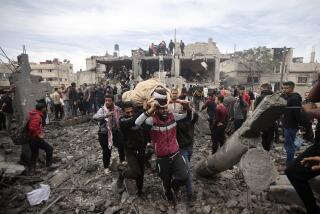Both Sides in Bosnia War Threaten to Use U.N. Troops as Human Shields : Balkans: The government army, borrowing Serbs’ tactic, is stealing weapons and confining peacekeepers.
- Share via
SARAJEVO, Bosnia-Herzegovina — U.N. peacekeepers were threatened from both sides of the Bosnian war Tuesday in a further sign of how quickly their mission here is deteriorating.
Bosnian government soldiers defending the “safe area” of Zepa surrounded the U.N. camp there and said they would use the 65 Ukrainian peacekeepers inside as human shields against rebel Serb attack unless the United Nations called in NATO air power.
The Bosnian Serbs targeted the same Ukrainian camp and said they would start shooting if warplanes from the North Atlantic Treaty Organization appear.
“It’s a ‘Catch-22’ situation without an outcome that will satisfy [either of the two] parties,” U.N. spokesman Alexander Ivanko said. “It just shows what it means being a peacekeeper in an ongoing war.”
The Bosnian Serbs have routinely taken U.N. peacekeepers hostage or threatened their well-being. Now, a desperate and increasingly disillusioned Bosnian government army is borrowing the same tactic, both stealing U.N. weapons and confining peacekeepers.
One U.N. official said the showdown in Zepa, apparently the first of its kind where peacekeepers are imperiled from both sides at the same time, represents the best argument to date for withdrawing the mission altogether from the Balkans.
The latest crisis comes as major Western powers and Russia debate the future of the increasingly impotent U.N. peacekeeping force, which has seen Bosnian Serb defiance thwart each of its principal duties, from the delivery of humanitarian aid to the protection of civilians in six designated safe areas.
Among the options under consideration is the deployment of British and French troops, in American helicopters, to bolster the protection of Gorazde, the third and last eastern enclave--after Zepa and fallen Srebrenica--and home to about 60,000 Bosnian Muslims and 410 British and Ukrainian peacekeepers.
Bosnian Serb leader Radovan Karadzic threatened to attack any Western troops or aircraft involved in such a rescue mission. “Whoever sides militarily with the Muslims must be aware that this would entail a war against the Serbs,” Karadzic said in a statement issued Tuesday night from his headquarters in Pale, nine miles southeast of Sarajevo. “We shall be forced, in self-defense, to shoot down the helicopters and aircraft which protect the Muslim army.”
Bosnian Serbs pounded Zepa, one of the six U.N.-designated safe areas and with an estimated 16,000 Muslim inhabitants, with artillery and tank fire for the fifth consecutive day but failed again to overrun the enclave. Spokesmen for the U.N. mission could not be sure whether the nationalist Serbs had advanced since all of their monitors were either hostages, surrounded or otherwise restricted.
Ham radio operators reported that fighting continued in the remote, mountainous enclave, whose steep valleys and forested hills give defenders a slight advantage. “We have casualties, a lot of casualties,” one operator told reporters in Sarajevo. “The humanitarian situation here is horrifying; almost no medicine is available.”
The rebel Serbs, on a campaign to wipe out the last vestiges of Muslim presence in eastern Bosnia-Herzegovina, have so far refused a plea by Bosnian President Alija Izetbegovic to negotiate the evacuation of the elderly, women and children from Zepa. Izetbegovic said he hoped to avoid the atrocities, including gang rapes and the murder of civilians, reportedly committed by Bosnian Serbs when they captured Srebrenica last week and expelled more than 30,000 Muslim refugees in the largest single forced exodus--”ethnic cleansing”--of the 39-month war.
He said in an interview on Bosnian state radio that removing the weak, sick and civilians would free up the army and militia to better defend the town. Asked if such an evacuation wasn’t the kind of “ethnic cleansing” that the rebel Serbs wanted, Izetbegovic said: “Yes, it is. But there is something worse than ‘ethnic cleansing’--ethnic killing.”
His offer was relayed to the Bosnian Serbs by Lt. Gen. Rupert Smith, commander of U.N. forces in Bosnia. But the nationalist Serbs set a number of conditions on the evacuation, starting with the demand that all people in Zepa first lay down their weapons, diplomatic sources familiar with the negotiations said. The Bosnian government rejected that demand.
While Izetbegovic’s proposal to negotiate with the enemy clearly had a humanitarian motivation, it also appeared to reflect a recognition that the enclave was doomed. “It seems to show an acknowledgment of the unavoidable fact that Zepa cannot be defended,” said a European diplomat.
Once Zepa surrenders or is conquered, the Bosnian Serbs are expected to turn their sights on Gorazde. Fearful of imminent attack, Bosnian government troops on Sunday stormed the Ukrainian compound in Gorazde and seized all the peacekeepers’ weapons.
The soldiers also roughed up the Ukrainian commander when he resisted handing over the weapons and held a gun to his head, U.N. officials said, in what Ivanko labeled “outrageous and inexcusable” behavior.
U.N. officials said they did not receive a full report on the Gorazde incident until Tuesday because the army troops took the Ukrainians’ radios. The soldiers apparently targeted the Ukrainians and not the British because they are more familiar with Russian weaponry. Also, relations have been strained between Bosnian government forces and the Ukrainians, whom the Bosnians see as allies of the Serbs, with whom the Ukrainians share the Orthodox religion.
An international arms embargo has limited the Bosnian government’s access to weaponry. Government officials have long pleaded for the embargo to be lifted.
More to Read
Sign up for Essential California
The most important California stories and recommendations in your inbox every morning.
You may occasionally receive promotional content from the Los Angeles Times.











